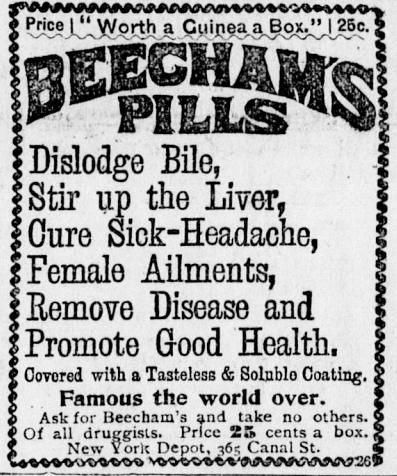Today the Beecham brand is known for over the counter cold and flu remedies and is part of the portfolio of GlaxoSmithKline one of the top half dozen pharmaceutical companies in the world. But the origins are surprising.
When he was 8 years old Thomas Beecham became a shepherd’s boy tending sheep in Oxfordshire and it was during this time he learned about herbal medicine. In his early twenties he moved to Wigan where he was a hawker making and selling Beecham’s Pills – a laxative tablet made up of aloe, ginger and soap.
He was very successful at selling the pills due in large part to the fact that they worked – unlike many of the other patent medicines on offer. As a result he received many (genuine) testimonials praising the efficacy of the pills. By the late 1850’s he had opened a shop in St Helen’s (Merseyside) and was advertising across Britain – adverts started appearing in Welsh newspapers around 1858. However although effective as a laxative the claims in the newspaper adverts (and on the notes included with each box) do seem extravagant.
"these renowned pills are composed entirely of Medicinal Herbs, and cure Constipation, Headache, Dizziness or Swimming in the Head, Wind, Pain, and Spasms at the Stomach, Pains in the Back, Restlessness, Insomnia, Indigestion, Want of Appetite, Fullness after Meals, Vomitings, Sickness of the Stomach, Bilious or Liver Complaints. Sick Headaches, Cold Chills, Flushings of Heat, Lowness of Spirits, and all Nervous Affections, Scurvy and Scorbutic Affections, Pimples and Blotches on the Skin, Bad Legs, Ulcers, Wounds, Maladies of Indiscretion, Kidney and Urinary Disorders, and Menstrual Derangements.”
Success continued to the extent that in 1880 Thomas Beecham he opened his first factory and during the following decades the company flourished  and sold the pills internationally although carried out almost no medicinal research.
and sold the pills internationally although carried out almost no medicinal research.
In the 1920’s and 1930’s it bought up other companies and brands such as Lucozade, Macleans (toothpaste) and Brylcreem but it wasn’t until the mid-1940’s that they became seriously involved in research and in the following decade developed a range of antibiotics and vaccines as well as developing a range of personal care products and soft drinks includingTango, Corona and Quosh. The manufacture of the pills ended in 1998
In the 1990’s through acquisitions and mergers the Beecham Group first became SmithKline Beecham and ultimately part of GlaaxoSmithKilne. Not bad for a shepherd’s boy.

